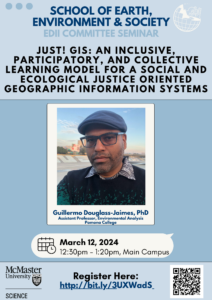Just! GIS: Public Lecture with Dr. Guillermo Douglass-Jaimes
Mar 12, 2024
12:30PM to 1:30PM
Date/Time
Date(s) - 12/03/2024
12:30 pm - 1:30 pm
Just! GIS: An Inclusive, Participatory, and Collective Learning Model for a social and ecological justice oriented Geographic Information Systems’
Dr. Guillermo Douglass-Jaimes

Maps have the power to reveal hidden and uneven impacts of COVID-19, global climate change, environmental pollution, and more. Geographic Information Systems (GIS) act as the unseen infrastructures for gathering, managing, and analyzing data that is or can be mapped; guiding policymakers, businesses, communities, and individuals to make important decisions. These sophisticated tools for modeling complex socio-spatial relationships are continually simplified with easy- to-follow drop-down menus and of-the-shelf plug-ins for mobile and desktop applications, expanding the user-base of mapmakers. Yet, how do we ensure that mapmakers think critically about their decisions and their impacts? How can we ensure that these tools are (re)oriented toward the ends of creating a more ecologically and socially just world? Further, how can we attempt to teach in a justice-oriented manner when we utilize technologies that are rooted in myriad forms of oppression (imperialism, neoliberal exploitation, resource extraction, and so on). Geographers have long engaged with notions of justice. Here I engage with the spatial and temporal dimensions of justice, which are shaped by processes across all scales from the macro – global systems of oppression to the micro interpersonal and internalized oppression, and all the messy entanglements in between. I use Just! (Just factorial) as a legible signal of our efforts to move together, building on the work of those who came before us as we respond to our present moment. Efforts in the classroom can recognize the larger oppressive forces at play and seek to build within the spheres of our control to create what I call a fractal of justice, one that is bounded within the limits of the classroom, while recognizing that our ability to move toward justice are vast when we work together.
Guillermo Douglass-Jaimes, the son of Mexican immigrants, is a first-generation college graduate and Assistant Professor in the Environmental Analysis Program at Pomona College. He received his higher education across the University of California system with a bachelor of science in environmental Science from UC Riverside; a MA in Urban Planning from UCLA and, PhD environmental Science, Policy, and Management from UC Berkeley. His work is situated in global health equity and is driven by an interest and inquiry in how conceptions of place and identity can be products of social marginalization as well as sources for community resilience. His most recent work has focused on a collaborative mapping project to highlight the work of favela communities in Rio de Janeiro, Brazil through a webmap that seeks to bring communities together virtually and in-person for sharing ideas, strategies, and resources for creating sustainable and resilient communities.
Tuesday March 12, 2024
12:30pm – 1:20pm
McMaster Campus – CNH B107
Presented by the SEES EDII Committee
